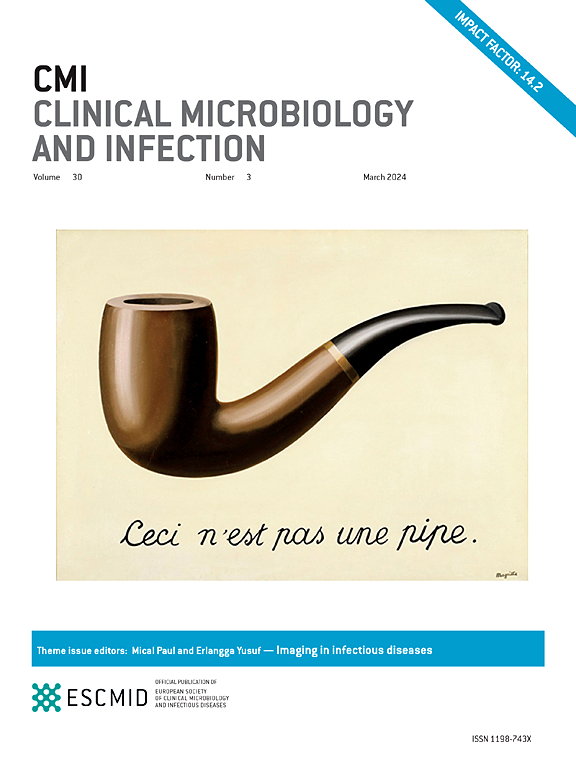感染预防--如何预防 CO-MRSA 的社区传播?
IF 10.9
1区 医学
Q1 INFECTIOUS DISEASES
引用次数: 0
摘要
背景金黄色葡萄球菌是一种多功能生物,既能作为共生生物存在,又具有致病潜力。耐甲氧西林金黄色葡萄球菌(MRSA)在临床上和基因上的不同菌株(称为社区发病型 MRSA(CO-MRSA))的出现,导致了在没有传统风险因素的健康人中发生侵袭性皮肤和软组织感染(SSTI)的流行。金黄色葡萄球菌定植是感染的一个风险因素,也是向密切接触者传播的一个来源。据描述,金黄色葡萄球菌 SSTI 在拥挤的环境和家庭中爆发。本综述旨在提供一种全面的、以证据为基础的方法来预防 CO-MRSA 的传播。我们重点介绍了一些重要的临床试验,这些试验强调了家庭和环境中金黄色葡萄球菌定植在传播家庭传播中的重要性。最后,我们强调了预防金黄色葡萄球菌感染的研究重点。内容我们推荐的治疗皮肤脓肿患者的方法包括初始感染的最佳治疗和卫生教育。对于反复感染 SSTI 的患者或其家庭成员患有 SSTI 的患者,应建议采取去殖民化措施。由于反复皮肤感染的高发病率,金黄色葡萄球菌感染会导致大量死亡和发病。虽然目前的去殖民化策略是有益的,但干预措施往往会给家庭带来高昂的费用,而且效果会随着时间的推移而减弱。最近完成的一项试验对定期去殖民地化和家庭环境卫生进行了综合评估,其结果将进一步加深我们对什么是可持续的去殖民地化方法的理解。此外,新的预防策略正在开发中,如金葡菌疫苗、溶菌剂、益生菌、微生物群移植和噬菌体疗法。本文章由计算机程序翻译,如有差异,请以英文原文为准。
Infection prevention—how can we prevent transmission of community-onset methicillin-resistant Staphylococcus aureus?
Background
Staphylococcus aureus is a versatile organism, capable of existing as a commensal organism while also possessing pathogenic potential. The emergence of clinically and genetically distinct strains of methicillin-resistant S. aureus (MRSA), termed community-onset MRSA (CO-MRSA), resulted in an epidemic of invasive and skin and soft tissue infections (SSTI) in otherwise healthy individuals without traditional risk factors. Colonization with S. aureus is a risk factor for developing infection and also a source of transmission to close contacts. Outbreaks of S. aureus SSTI have been described in crowded settings and within households. Thus, preventive strategies are essential to interrupt recurrent infections.
Objectives
The objective of this narrative review is to provide a comprehensive, evidence-based approach to prevent transmission of CO-MRSA. We highlight key clinical trials that emphasize the importance of household and environmental S. aureus colonization in propagating household transmission. Finally, we highlight research priorities to prevent S. aureus infection.
Sources
We cite primary literature from peer-reviewed publications as sources for this review.
Content
Our recommended approach to the management of individuals presenting with skin abscesses includes optimal treatment of the initial infection and hygiene education. Decolonization measures should be recommended for individuals with recurrent SSTIs or whose household members have SSTIs. Targeted decolonization with topical antimicrobials should be prescribed to all affected individuals within the household.
Implications
S. aureus infections result in substantial mortality and morbidity because of the high incidence of recurrent skin infections. Although current decolonization strategies are beneficial, interventions are often costly to families and effectiveness wanes over time. Results from a recently completed trial evaluating integrated periodic decolonization and household environmental hygiene will further add to our understanding of what constitutes a sustainable decolonization approach. In addition, novel preventive strategies are being developed such as S. aureus vaccines, lytic agents, probiotics, microbiota transplants, and phage therapy.
求助全文
通过发布文献求助,成功后即可免费获取论文全文。
去求助
来源期刊
CiteScore
25.30
自引率
2.10%
发文量
441
审稿时长
2-4 weeks
期刊介绍:
Clinical Microbiology and Infection (CMI) is a monthly journal published by the European Society of Clinical Microbiology and Infectious Diseases. It focuses on peer-reviewed papers covering basic and applied research in microbiology, infectious diseases, virology, parasitology, immunology, and epidemiology as they relate to therapy and diagnostics.

 求助内容:
求助内容: 应助结果提醒方式:
应助结果提醒方式:


